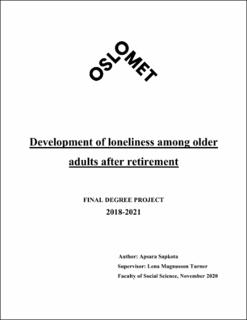| dc.description.abstract | Research has long demonstrated that feeling of loneliness increases in older adults which is a key risk factor for poor health. However, less is known about the development and factors leading to loneliness after retirement. These questions were examined using second and third wave data obtained 10 years apart in the population-based NorLAG study (N=903 for 2007 and N= 836 for 2017). Results indicated that there is slight increase in the percentage of males and females feeling lonely after retirement. Moreover, there is significant effect of loneliness before retirement on loneliness after retirement. However, there is not any effect of age and number of years of retirement on loneliness after retirement. A probability model was carried out to identify the probability of feeling lonely before and after retirement. For the entire sample, age, being single, being a widow, being divorced, without social contacts and neuroticism predicted loneliness before retirement. Among males, age, being single, being divorced, bad health condition, without social contacts and neuroticism predicted loneliness and among females being divorced, without social contacts, extraversion and neuroticism predicted loneliness before retirement. Where as, loneliness before retirement, being a widow, being divorced and income predicted loneliness in entire sample after retirement. Among males, loneliness before retirement and being a widow predicted loneliness and among females, loneliness before retirement, being a widow, higher university education and income predicted loneliness after retirement. I take this result to illustrate the utility of combining self-report and register data and conclude that the development of loneliness among older adults is more related to several socioeconomic and demographic factors and less related to retirement per se. | en_US |
